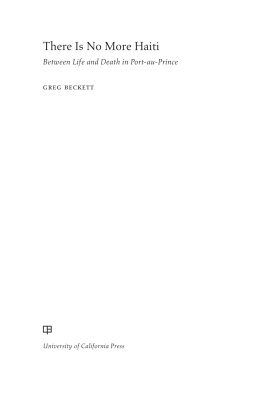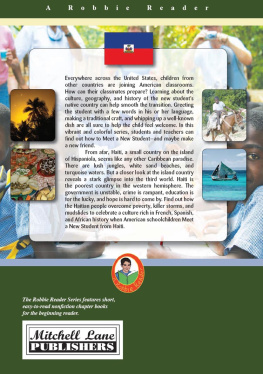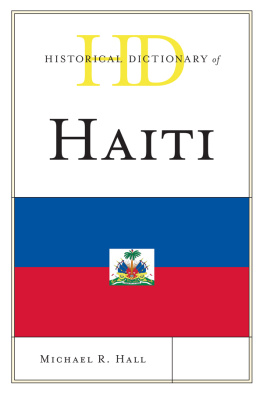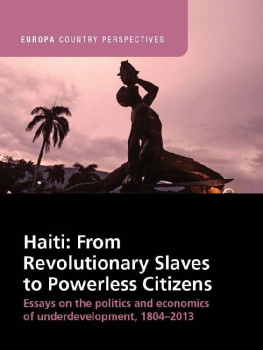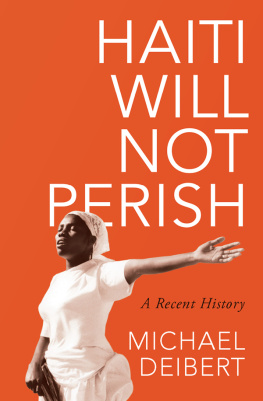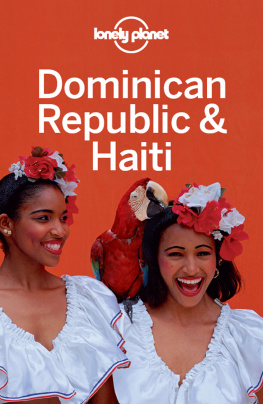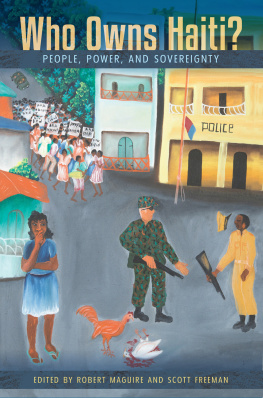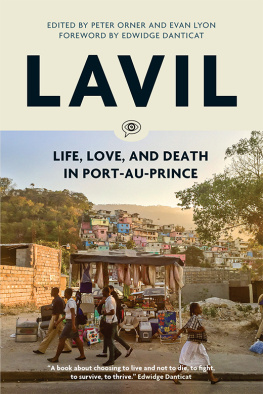Acknowledgments
This book would not have been possible without the generosity of friends and colleagues in Haiti. To each of them, I owe a debt I may never be able to repay, but I hope this book begins to make good on that debt. I hope, too, that for those no longer with us, this book serves as a testament that they were here and that their spirit remains with us, always.
The research on which this book is based benefited from the support of the Social Sciences and Humanities Research Council of Canada and of the Department of Anthropology and the Center for Latin American Studies at the University of Chicago. The Society of Fellows at the University of Chicago provided an intellectual home for me during an important part of the research and writing. A Faculty Development Grant from Bowdoin College offered generous support for a year of writing during which this manuscript was completed. Portions of chapter 3 appeared previously in Master of the Wood: Moral Authority and Political Imaginaries in Haiti ( PoLAR: The Political and Legal Anthropology Review, 2004), and portions of chapter 5 appeared previously in A Dogs Life: Reflections on the Humanitarian Situation in Haiti ( American Anthropologist, 2017).
Over the years, my thinking about crisis and Haiti has been shaped by many conversations with friends and fellow scholars in Haiti, the United States, and Canada. I thank all of you for sharing your ideas with me. I would like to give special thanks to Yarimar Bonilla, who provided intellectual support at every step along the way. Her own scholarship in the Caribbean continues to inspire me. I would also like to thank the many teachers and advisors who have pushed me to think more deeply about the world, especially John Comaroff, Stephan Palmi, and Michel-Rolph Trouillot. At the University of Chicago, I benefited from an amazing group of people who were always willing to give patient and supportive feedback. Our many conversations helped shape my thinking immeasurably. I would like to thank in particular Andrew Dilts, Ben Eastman, Reha Kadakal, and Michael Ralph. I have also benefited from the influence and support of fellow scholars of Haiti. A special thank you to Fabienne Doucet, Chelsey Kivland, Millery Polny, Mark Schuller, and Pierre Minn. Pierre patiently read and commented on the entire manuscript, and the end result is much the better for it.
Thank you to Deborah Thomas and Brad Weiss, both of whom provided nuanced, thoughtful, and critical readings of the manuscript. Their comments and suggestions helped make this a stronger book. Thanks also to Chris Nelson for being such a supportive writing partner and to my many friends in Write Club who cheered me along as I completed the manuscript. This book would not have been possible without the support of friends and family. I would like to thank in particular my parents, for always being there, Cameron Brohman and Luke Mattar, for years of amazing conversations about Haiti and so much more, and Derek Bessey, who helped me find a way when I felt most stuck. Many thanks as well to my editor Kate Marshall and to everyone at University of California Press who helped shepherd this book from a hazy idea to a finished product.
Finally, I owe the greatest debt to my partner Michelle, who has lived with this project as long as I have. She has been my guiding star, and she helped me to see both the forest and the trees. Her love and encouragement, her persistence and presence, and her critical mind and sharp editorial eye have meant more to me than she may ever know.
Introduction
This is a story. A story about how crisis feels, about what it is like to live your life in the midst of forces that seem destined to destroy you. But its not the story that I set out to write. You might say that the story found me, that I am a part of this story that takes shape somewhere in the gap between hope and despair. And like all stories, it has to start somewhere.
Perhaps it is a long story, spanning centuries. A story full of war and revolution, the rise and fall of kings and countries, the end of empires and the birth of new nations. A story of a new world, of slavery and sugar, of the massive demographic displacement of the Middle Passage. It is an epic story of freedom and rebellion, but also a tragic one of debt and dependency. It is a story of people living and working on their own land, of families growing food and tending crops and making their way in the world. And yet it is also a story of a global economy so vast in scale and scope that it can only be rendered in abstract terms as the momentous struggle between capital and labor. It is a story of the transformation of the environment, the shaping of the landscape, the cutting down of trees and the planting of sugarcane or coffee or other crops destined to be consumed by people on the other side of the world. A story that ends in deforestation and soil erosion as the hills turn to stone and the dirt runs away, to be chased later by the peasants who once farmed those same eroding hills. A story of a city that grew into a monster, a city full of people fleeing what the experts call the crisis of the countryside, a city full of people desperately trying to make a living. There are many places along the way where we could begin, and there are many ways to tell such stories. This story starts here, but it could just as easily have begun somewhere else.
I went to Haiti for the first time in the summer of 2002. Before that, I studied Haitian history and culture for years. When I was in school in the 1990s,
Before I went to Haiti, I moved to Chicago to study anthropology. There, I learned to think about globalization and the world economy from a Caribbean point of view, from a standpoint that made a place like Haiti central to the sweeping arc of world history. I read Haitian history with an eye to the present. I read about the revolution and its aftermath, about the rise of the peasantry and the urban merchant elite, about how the U.S. military occupation of Haiti from 1915 to 1934 set the stage for the economic and political crises that followed. I read about the terror and violence of the Duvalier dictatorship, about the democratic transition and the military coups that came with it, and about the many international interventions that some Haitians call a second occupation. I read about the many crises facing the country, about what the international community referred to as the Haitian crisis, as if the country were inextricably defined by that word. Later, after I went to Haiti, I came to see that the country was not as exceptionalnot as odd as so many people seemed to say it was. It was an ordinary place, a place where the majority of Haitians live quite ordinary lives. They eat what is for themand for many othersquite ordinary food. They die quite ordinary deaths from quite ordinary accidents, quite ordinary tortures, quite ordinary diseases. Accidents so ordinary that they could be prevented. Tortures so ordinary that the international press does not even mention them. Diseases so ordinary that they are easily treated almost anywhere else. And I came to see how the Haitian crisis was ordinary too, that Haiti was a place filled with ordinary crisescrises so ordinary they could easily be prevented.

